Introduction
WhatsApp has emerged as a game-changer for businesses seeking to engage with their audiences effectively. With over 2 billion active users worldwide (Source: Statista, 2023), creating Meta-approved WhatsApp templates has become a crucial strategy for companies aiming to leverage this powerful platform.
According to a recent study by Mailchimp, businesses that incorporate Meta-approved WhatsApp templates into their marketing campaigns experience a staggering 70% increase in open rates. It also sees a 45% boost in customer engagement rates compared to traditional email marketing (Source: Mailchimp, 2024).
This remarkable statistic underscores the importance of adhering to best practices when crafting WhatsApp templates that resonate with audiences and drive meaningful interactions.
As businesses navigate the ever-evolving landscape of digital marketing, staying ahead of the curve and adopting cutting-edge communication strategies is essential for sustained success.
By mastering the Meta-approved WhatsApp templates, companies can foster deeper connections with their audiences and drive tangible business growth.
So continue reading to see the best practices for creating Meta approved WhatsApp templates.
Common Reasons for Template Rejection
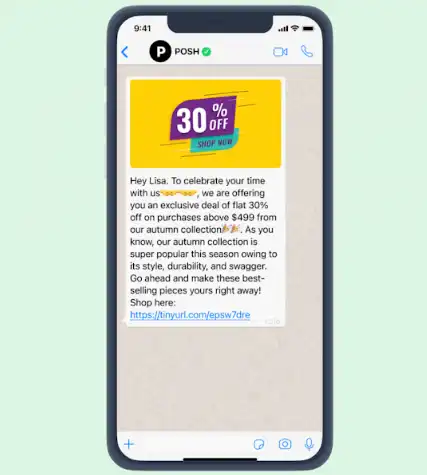
There are a few pitfalls that could get your template a big red rejection stamp. Too much promotional fluff is a no-go. Messages that come off as pushy sales pitches get the boot.
Also, if your template is confusing, unclear, or just too vague, it's likely to get rejected. Meta wants to ensure that the content is something users will want to read and find valuable.
So, when crafting those WhatsApp message templates, think about having a chat with a friend. Keep it simple, straightforward, and with a sprinkle of warmth.
Using a WhatsApp chatbot, like BotPenguin, can help automate this process. It also ensures your messages are on point and engaging, without crossing any lines.
Crafting Effective WhatsApp Templates: Best Practices
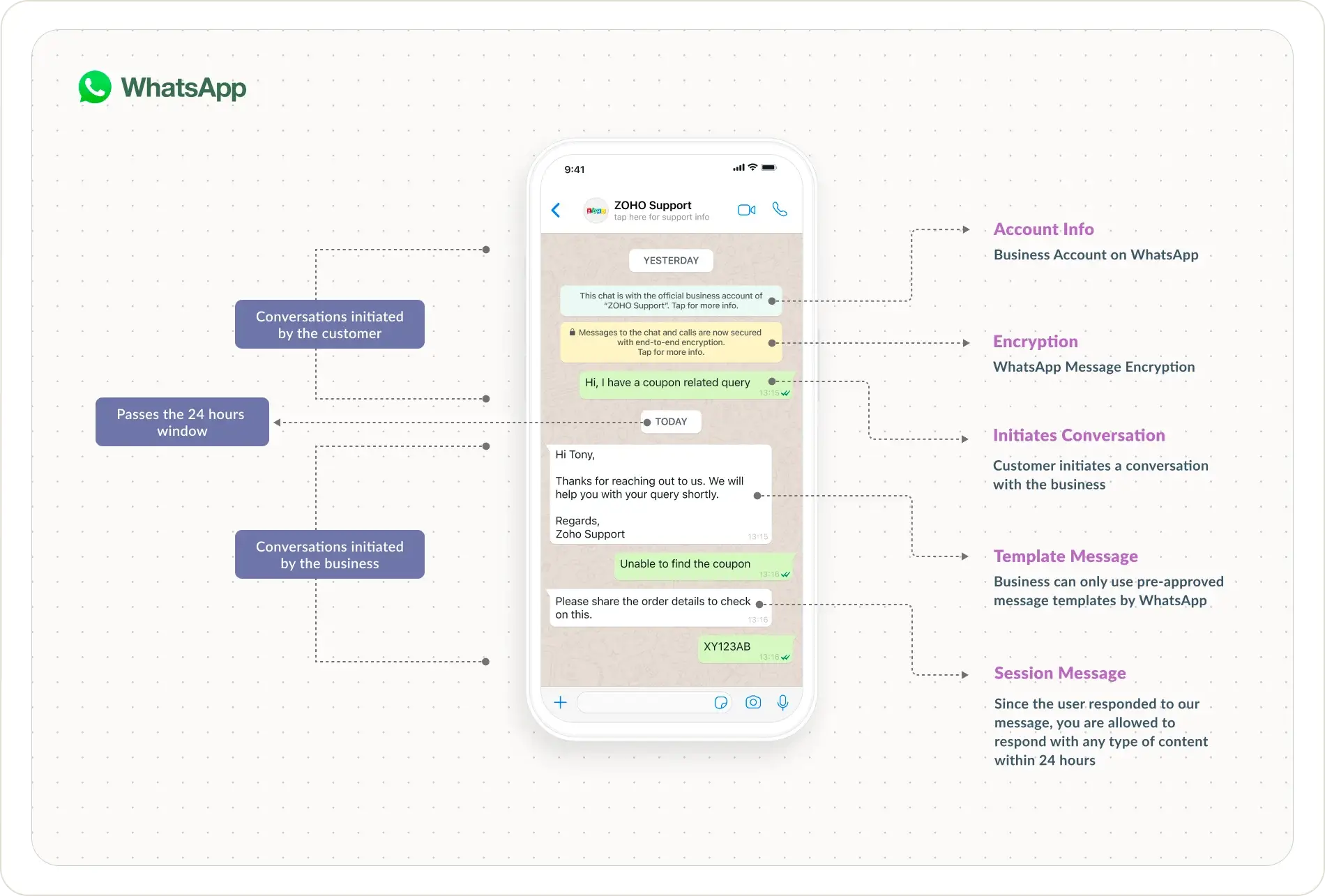
Creating WhatsApp templates that resonate with your audience involves a mix of clarity, friendliness, and a touch of personalization.
Let’s dive into some best practices that can turn your templates from good to great.
Keep it Concise and Clear
When it comes to WhatsApp message templates, less is more.
Pack your message with only the essential info your reader needs. Imagine you’re trying to tell a busy friend something important; you'd get straight to the point, right? Do the same here.
Write in a Conversational Tone
The secret ingredient of a killer WhatsApp template is making it sound like it’s coming from a friend.
Use simple words, throw in a casual greeting, and avoid sounding too formal. It makes your message more likely to be welcomed and read.
Personalization Power
Here’s where the magic happens. Using placeholders like {{customer name}} adds a human touch to your messages.
It's like calling someone by their name in a crowded room; it grabs their attention instantly.
Structure and Readability
Break down your information into bite-size pieces. Short paragraphs or bullet points work wonders for making your WhatsApp business message templates easy on the eyes.
Remember, if it's easy to read, it's easy to understand.
Technical Specifications for Meta Approval
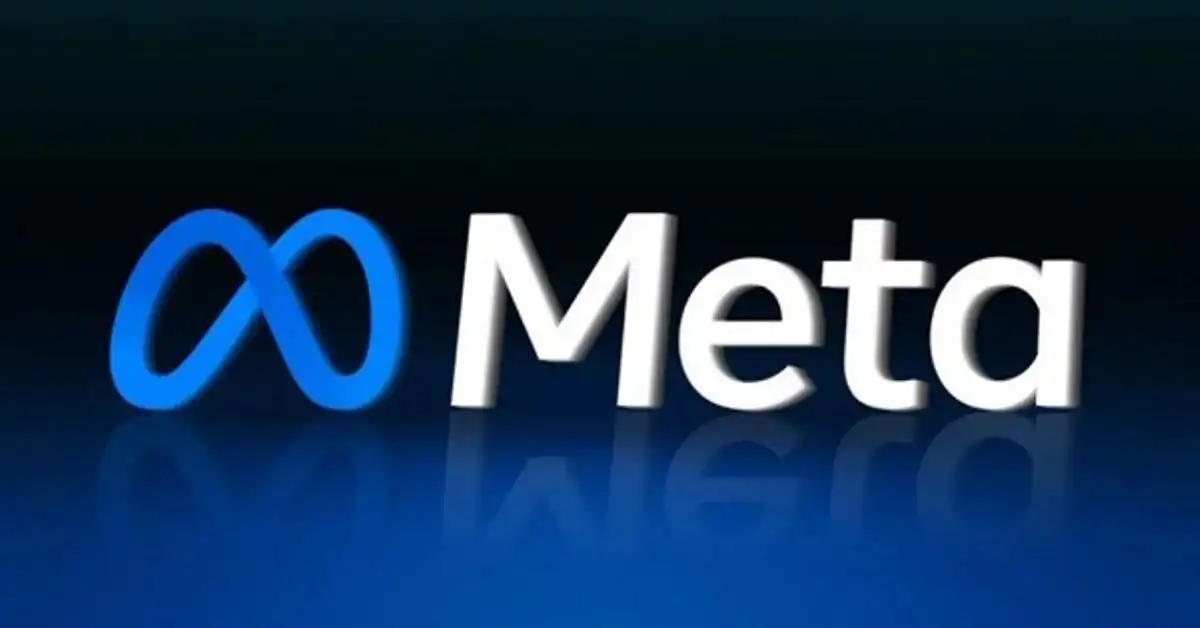
To glide through Meta's approval process for your WhatsApp templates, keeping an eye on some technical specs is crucial. Let’s get right into it.
Adherence to Character Limits
Every message has a sweet spot – for WhatsApp, it's 512 characters.
Stick within this limit to keep your message concise and ensure it meets approval standards.
Permitted Characters
Keep it simple with lowercase alphanumeric characters and underscores.
This ensures your message is straightforward and avoids any issues with special characters that might not be supported.
Suggested Reading:
How WhatsApp Messaging Templates can Boost Marketing ROI?
Avoiding Special Characters and Formatting Issues
Special characters like emojis or unique formatting like newlines and tabs might tempt you, but they can trip you up.
Stick to the basics to avoid any hiccups in the approval process.
Building Trust and User Experience
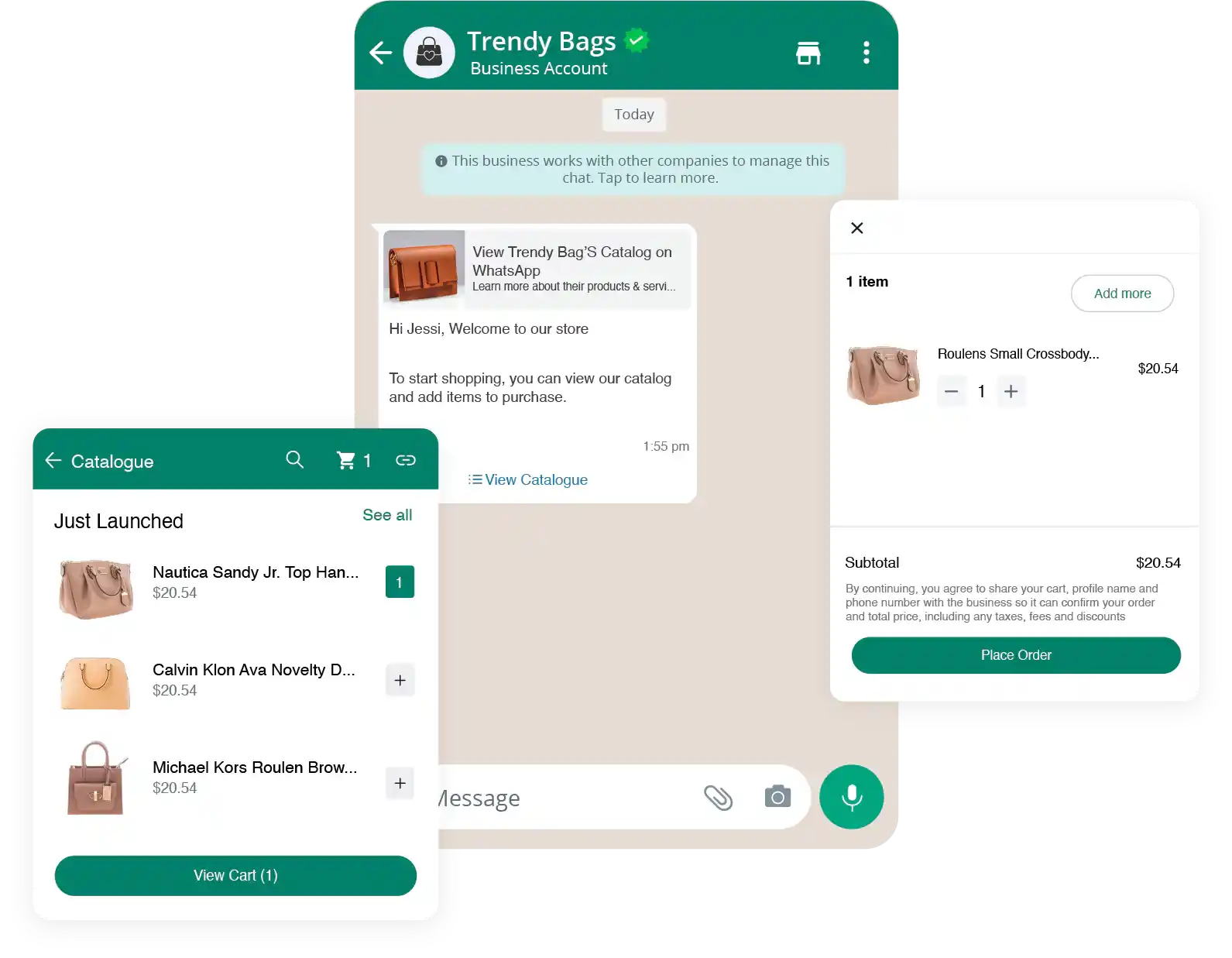
Building a relationship with your audience through WhatsApp hinges on trust and a smooth user experience. Let's dive into how you can create this environment confidently.
Transparency and Opt-In Reminder
Start by being clear about why someone is receiving your message. It’s like being invited into their digital home; you want to make sure they know why you're there.
This not only builds trust but also makes sure your WhatsApp templates are welcomed.
Clear Opt-Out Options
Everyone values their choice to say no. Providing an easy way for users to opt-out or unsubscribe from your messages shows you respect their preferences.
It's like showing them where the door is, in case they want to leave, no hard feelings.
Value-Driven Communication
Your messages should be like gifts, not spam. Focus on sending stuff that matters to them, whether it’s helpful information or updates.
If your WhatsApp templates are useful, people will pay attention.
Examples of Meta-Approved WhatsApp Templates
Let’s put theory into practice with some examples. These WhatsApp message templates shine in different scenarios by being useful and easy to understand.
Order Update Templates
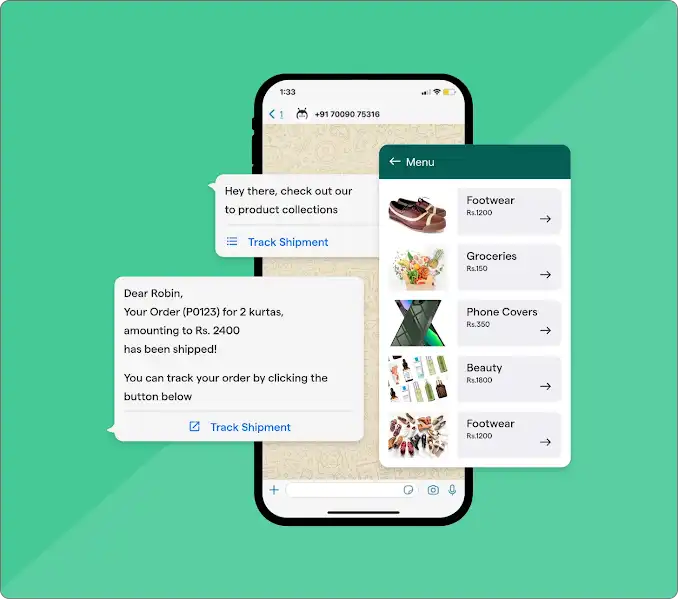
Think of getting a message that your order is confirmed or shipped. It's a relief, right? Here’s how it can look:
- Order Confirmation: “Hey there! We've got your order (#12345). It’s being prepped and will be on its way soon. Thanks for choosing us!”
- Shipment Notification: “Good news! Your order (#12345) has been shipped and is on its way to you. Track it here: [link].”
Appointment Reminders
Appointments can slip through the cracks of a busy life. Gentle reminders can be lifesavers:
- Appointment Confirmation: “Your appointment is set for DATE at TIME. If you need to reschedule, here’s how: [link].”
- Reschedule Options: “Can’t make it to your appointment? No worries, reschedule easily here: [link].”
Suggested Reading:
Examples of High Converting WhatsApp Messaging Templates
Customer Support Interactions
Sometimes, things don’t go as planned. Quick updates on support tickets or resolutions can ease a lot of tension:
- Ticket Update: “We’re on it! Your ticket (#12345) is being looked at, and we’ll update you by DATE. Thanks for your patience.”
- Resolution Notification: “Your issue (#12345) has been resolved. If you’re still experiencing problems or have questions, reply to this message for further assistance.”
Using WhatsApp templates like these, you ensure your communication is clear, valuable, and respectful of the user’s space and time.
Adding in BotPenguin WhatsApp chatbot can further streamline these interactions, making them instant and always available. Remember, the goal is to make each message feel like it's coming from a helpful friend rather than a faceless brand.
Advanced WhatsApp Template Techniques
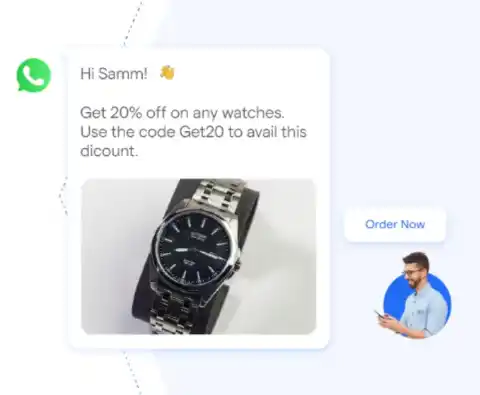
When we talk about upping our game with WhatsApp templates, it's like we're adding some cool gadgets to our toolkit.
These features aren't just fancy; they make it way easier for people to interact with your messages. Let's explore how.
Including Interactive Buttons
Imagine sending a message that not only tells your customers their order is on the way but also includes a "Track Order" button.
With one tap, they're seeing exactly where their package is. Or, if someone needs help, they can hit a "Reply for Support" button to get in touch. It's like giving your messages superpowers—straightforward and super useful.
Suggested Reading:
7 Must-use Whatsapp Templates for Automation!
Utilizing Quick Replies for User Convenience
Quick replies are like shortcuts for your customers. Instead of typing out a whole response, they can choose from options you've already set up.
It could be as simple as tapping "Yes" or "No," or picking a time slot for an appointment. It’s like those choose-your-own-adventure books, but for chatting. Convenience is key.
Testing and Refining Your WhatsApp Templates
Before you roll out your WhatsApp templates to the world, it’s like doing a taste test before serving dinner. You want to make sure everything’s just right.
Importance of Internal Testing and User Feedback

Doing a test run with your team helps catch any hiccups before your customers see them. It’s about getting the recipe perfect. Once you start sending them out, keep an ear to the ground for what your customers are saying.
If they're finding certain WhatsApp templates super helpful or maybe a bit confusing, that’s gold. It means you can tweak and improve. Getting it right is a mix of science and art, relying on real reactions to guide the way.
Meta-Approved Templates: A Stepping Stone
Getting your WhatsApp templates approved by Meta is like opening the first door in a long hallway of opportunities.
Think of it as getting the basics right before throwing in your unique flair. These templates are not the end game but the start.
They ensure your messages look good and make sense to your audience, all while keeping in the rules of the game. But remember, it's what you do next that really counts.
Making use of WhatsApp message templates is like having a sturdy foundation for your house. Now, it's time to decorate and make it a home.
Each message you send is a chance to connect, engage, and win over your audience. The trick is using these approved templates creatively without stepping out of bounds.
Beyond Approval
Sure, the stamp of approval is essential, but it’s the personal touches you add later that make each interaction special.
Whether it's customizing messages with a person's name or adding in those interactive buttons we talked about, the goal is to make every WhatsApp message feel like it's speaking directly to the recipient.
Conclusion
WhatsApp templates that have the Meta seal of approval set the stage, but it's how you use them that steals the show. They help you start on the right foot, ensuring your messages are always welcomed and not turned away at the door.
Remember, sending WhatsApp business message templates is not just about pushing information out. It's about sparking conversations, building relationships, and creating moments that matter. Keep your messages clear, timely, and, most importantly, personal. Avoid sending too many messages in a short period to not overwhelm your audience.
Think of each message as a small nod or a wave to your customers, a way to say, "Hey, we're here, and we're listening." Use WhatsApp chatbots wisely to handle FAQs while saving the real conversational gems for human touch.
In the end, it's a blend of WhatsApp chatbot efficiency and the human warmth of personalized messages that create the perfect user experience. Make every message count, keep refining your approach based on feedback, and watch how those approved templates turn into bridges connecting you to your audience.
Frequently Asked Questions (FAQs)
What are Meta-approved WhatsApp templates?
Meta-approved WhatsApp templates are pre-formatted message structures vetted by Meta for businesses to use for standardized, automated communication on WhatsApp.
How should my WhatsApp templates be structured for approval?
Ensure clarity, conciseness, and a professional tone. Include clear call-to-actions and avoid promotional language that could be flagged as spam.
Can I use multimedia in my WhatsApp templates?
Yes, you can include images, videos, and documents to make your messages more engaging, but they must be appropriate and relevant to the content.
What is the key to maintaining personalization in approved templates?
Personalization tokens allow you to insert user-specific information, making templated messages feel more personal and tailored to the individual.
How do I avoid my WhatsApp template from being rejected?
Adhere to WhatsApp’s policies; avoid misleading information, grammatical errors, and excessive capitalization or punctuation, which might be seen as unprofessional or spammy.


